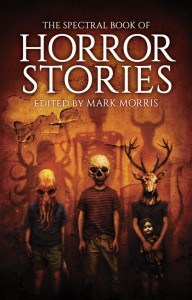 The two main things you need to know about Mr Gary McMahon are that he is disgustingly prolific and disgustingly talented in the creeping-you-out department. Just read The Bones of You, Reaping the Dark, and What They Hear in the Dark and then try sleeping. I dare you. Below, Gary takes some time out from scaring the brown stuff out of readers in order to talk about, well, what scares the brown stuff out of him, as well as his story for The Spectral Book of Horror Stories.
The two main things you need to know about Mr Gary McMahon are that he is disgustingly prolific and disgustingly talented in the creeping-you-out department. Just read The Bones of You, Reaping the Dark, and What They Hear in the Dark and then try sleeping. I dare you. Below, Gary takes some time out from scaring the brown stuff out of readers in order to talk about, well, what scares the brown stuff out of him, as well as his story for The Spectral Book of Horror Stories.
1. Can you remember the first horror story you read that made an impact on you?
Dracula by Bram Stoker. Definitely. I remember watching the great BBC adaptation in the late 1970s, when I was far too young to be doing so, and a school friend managed to sneak his mother’s copy of the novel out of the house so that I could borrow it. I must have been about eight or nine years old. I probably didn’t understand it all (although I had a very advanced reading age), and I have no doubt that I’d read horror stories before, but, my God, that particular book changed my life. It mesmerised me.
2. What inspired the story you wrote for this anthology?
I wrote “Dull Fire” when I was trying to recover from a 12-month long creative block. I went back to basics and wrote the kind of story that I felt had got me noticed in the first place – raw, confrontational, a story about parental abuse and how it can haunt people for the rest of their lives. It was a purgative experience.
3. How would you describe the kinds of stories you usual write and does this Spectral Book of Horror story depart from that?
The word that keeps coming back to me is confrontational. I like to write stories that confront issues – usually my issues. It’s all I know. I don’t try to write scary stories; I want to write stories that disturb and engage the emotions. “Dull Fire” embraces that ethos completely.
4. In your heart of hearts do you prefer your horror to be of the slashy variety or of a more subtle psychological stripe?
There’s room for both, of course, but I prefer the psychological variety. I suppose it’s what a lot of people tend to call “literary horror”, but that isn’t to say the use of gore or violence isn’t valid when it’s done well. What I want from horror fiction is to be emotionally and creatively stimulated. Real life scares me, fiction doesn’t, so I’m not really interested in that aspect of the genre. All I ask is that the stories are crafted with care, that they are well written and actually have something to say. Fundamentally, for me, good horror fiction is all about people.
5. What are you currently reading? 
Dr Sleep by Stephen King, Great Expectations by Dickens, To the White Sea by James Dickey, and, as always, I’m dipping in and out of about ten or eleven short story collections.

